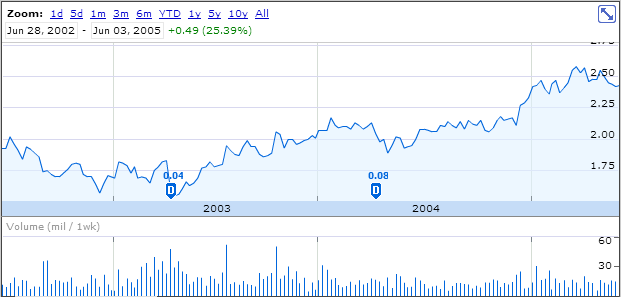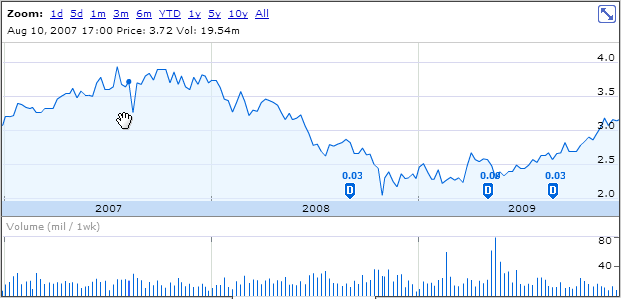Just had a meet up with someone new to investing. I totally understand how hard it is to read up all the jargons and finance related stuff when I started long time ago. It's like this big mountain of jargons in front of you, and in order to hold an intelligent conversation, you first have to learn the language and what those terms mean. That's one of the main purpose of this blog - to help newbies go through this path that I once walked alone.
The very first thing I did was to print out all those investing basic articles from investopedia. They changed their site, and I'm not used to it, so had a little bit of difficult finding the articles that I wanted to read. This is what I'll read first:
1. Stocks Basics: Introduction
Basically these are just very basic things like what are stocks, what's a bull and a bear, and how to buy and sell stocks.
2. Investing 101: Introduction
Here, we go deeper into the different types of investment vehicles, the concept of compounding and portfolio diversification
3. Introduction to Stock Trader Types
You'll learn about different kind of market participant (they call it trader here). Generally you can break up into two branches - Technical analysis (TA) and Fundamental analysis (FA). There's a lot of sub groups under these two categories...good to know about them.
4. Fundamental analysis
Here you'll learn about the terminology of FA. To really do well, you need to learn the language of business, which is accounting. So here's a few branch off from Fundamental analysis:
A. Accounting
We're not trying to be accountants, but we have to know enough to be able to derive useful information from the financial statements of a company. I'll pay attention to the 3 statements - cash flow statements, income statements and balance sheet and how they interact with each other.
B. Value investing
What's this about? The most famous follower of value investing, Warren Buffett, made this method both highly lucrative and difficult to follow. He's not really a true value investor, but let's just say he is at this point in time. Benjamin Graham is the father of value investing. Don't you want to find out how Buffett make his fortune using this methodology?
Update: 16-Dec-2014
Here's a very good video site by BuffettsBooks. It shows you several videos in a very structured course, guiding your through stocks, bonds, and the various financial ratios and a bit of accountings. From the namesake, this is slightly biased towards fundamental analysis, specifically Warren Buffett's 'way' (he never actually declared his method).
5. How to start trading
This is for the other big umbrella under TA. It's a little bit more detailed about the different kinds of traders. They participate in the market in ways that are vastly different from those from the FA side.
Important downloads (free!):
If you're interested in charts (basically TA requires you to read charts and draw squiggly lines in it), there's a free chart program (but have data for past 1 yr free only) called chartnexus that I've been using since forever. You can get it here.
6. Financial concepts
Still around? Haha, then it's time to re-look in a little bit more detail on some financial concepts like risk/return, diversification, dollar cost averaging, asset allocation etc..This is the big picture view of your portfolio, whereas how you construct your portfolio is based on whether you're more from the FA or TA side.
Alright, if you've survived all the reading, then it's time to get real dirty! You can start reading up on proper books on the 3 separate themes: Accounting, FA and TA. Only the first theme (accounting), you can just read enough to understand what you need to know. For the FA and TA themes, you probably need a few years (hopefully not inclusive of a few $xx,xxx of 'tuition' fees) to form your own opinion and your preferred methodology. I've written a post on the recommended reading list here so I won't repeat it again. But I found that all these books are catered to the US market, so some of the things are not relevant here. That's why there's always a need to contextualise some stuff here.
So here's my sites to read:
1. Bullythebear newbie's FAQ (if the links failed, here's another one straight from my blog, here)
2. SIAS Beginner's guide to investing
You probably want to revisit some of the things you've read. If neither FA or TA interest you because you really can't be bothered with investing and would very much prefer to have a life instead of reading all these stuff, you can read 1, 2, 6 and go straight to this:
7. Exchange traded funds
Most unit trusts and personal portfolio try to beat the market returns. By that, they usually benchmark themselves with STI (for our case) or DJ / SP500. You can buy the overall market instead of trying to beat it, so here's some info regarding ETFs. This is a passive kind of investing. Read up a bit more about dollar cost averaging (google it if you forgot what that means) and you can heck care about all these funny terminologies for good. Just put in a sum every now and then and get market returns. Minimum effort from your side.
Okay great, once you've done reading up all these stuff, you're at Primary 1 of the great stock market education. Sit for your PSLE, then O'lvls, then A'lvls, then degree, then masters, and finally pHd. Good luck and most importantly, work hard at your craft!
(Don't berate me for oversimplifying stuff...it's necessary to see the big picture here and understand that there's a lot of stuff to read and understand and you'll have to start from someone. This is at best a guide to start somewhere, nothing more.)
The very first thing I did was to print out all those investing basic articles from investopedia. They changed their site, and I'm not used to it, so had a little bit of difficult finding the articles that I wanted to read. This is what I'll read first:
1. Stocks Basics: Introduction
Basically these are just very basic things like what are stocks, what's a bull and a bear, and how to buy and sell stocks.
2. Investing 101: Introduction
Here, we go deeper into the different types of investment vehicles, the concept of compounding and portfolio diversification
3. Introduction to Stock Trader Types
You'll learn about different kind of market participant (they call it trader here). Generally you can break up into two branches - Technical analysis (TA) and Fundamental analysis (FA). There's a lot of sub groups under these two categories...good to know about them.
4. Fundamental analysis
Here you'll learn about the terminology of FA. To really do well, you need to learn the language of business, which is accounting. So here's a few branch off from Fundamental analysis:
A. Accounting
We're not trying to be accountants, but we have to know enough to be able to derive useful information from the financial statements of a company. I'll pay attention to the 3 statements - cash flow statements, income statements and balance sheet and how they interact with each other.
B. Value investing
What's this about? The most famous follower of value investing, Warren Buffett, made this method both highly lucrative and difficult to follow. He's not really a true value investor, but let's just say he is at this point in time. Benjamin Graham is the father of value investing. Don't you want to find out how Buffett make his fortune using this methodology?
Update: 16-Dec-2014
Here's a very good video site by BuffettsBooks. It shows you several videos in a very structured course, guiding your through stocks, bonds, and the various financial ratios and a bit of accountings. From the namesake, this is slightly biased towards fundamental analysis, specifically Warren Buffett's 'way' (he never actually declared his method).
5. How to start trading
This is for the other big umbrella under TA. It's a little bit more detailed about the different kinds of traders. They participate in the market in ways that are vastly different from those from the FA side.
Important downloads (free!):
If you're interested in charts (basically TA requires you to read charts and draw squiggly lines in it), there's a free chart program (but have data for past 1 yr free only) called chartnexus that I've been using since forever. You can get it here.
6. Financial concepts
Still around? Haha, then it's time to re-look in a little bit more detail on some financial concepts like risk/return, diversification, dollar cost averaging, asset allocation etc..This is the big picture view of your portfolio, whereas how you construct your portfolio is based on whether you're more from the FA or TA side.
 |
| Read and read and read and read. Or you can always lose $ and learn the hard way. |
Alright, if you've survived all the reading, then it's time to get real dirty! You can start reading up on proper books on the 3 separate themes: Accounting, FA and TA. Only the first theme (accounting), you can just read enough to understand what you need to know. For the FA and TA themes, you probably need a few years (hopefully not inclusive of a few $xx,xxx of 'tuition' fees) to form your own opinion and your preferred methodology. I've written a post on the recommended reading list here so I won't repeat it again. But I found that all these books are catered to the US market, so some of the things are not relevant here. That's why there's always a need to contextualise some stuff here.
So here's my sites to read:
1. Bullythebear newbie's FAQ (if the links failed, here's another one straight from my blog, here)
2. SIAS Beginner's guide to investing
You probably want to revisit some of the things you've read. If neither FA or TA interest you because you really can't be bothered with investing and would very much prefer to have a life instead of reading all these stuff, you can read 1, 2, 6 and go straight to this:
7. Exchange traded funds
Most unit trusts and personal portfolio try to beat the market returns. By that, they usually benchmark themselves with STI (for our case) or DJ / SP500. You can buy the overall market instead of trying to beat it, so here's some info regarding ETFs. This is a passive kind of investing. Read up a bit more about dollar cost averaging (google it if you forgot what that means) and you can heck care about all these funny terminologies for good. Just put in a sum every now and then and get market returns. Minimum effort from your side.
Okay great, once you've done reading up all these stuff, you're at Primary 1 of the great stock market education. Sit for your PSLE, then O'lvls, then A'lvls, then degree, then masters, and finally pHd. Good luck and most importantly, work hard at your craft!
(Don't berate me for oversimplifying stuff...it's necessary to see the big picture here and understand that there's a lot of stuff to read and understand and you'll have to start from someone. This is at best a guide to start somewhere, nothing more.)


















